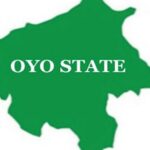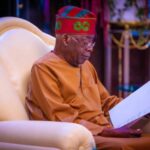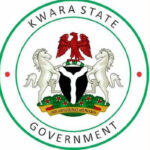Many Nigerians yearn for the opportunity to participate in a peaceful voting process, one where they can exercise their right to vote for leaders of their choice and witness the establishment of a national government that represents their rights, desires and aspirations. Indeed, a 2023 pre-election survey by Afrobarometer, a pan-African research network, found that 70 percent of respondents in Nigeria said they want a democracy. But little more than 1 in 4 registered voters in the country exercised their right to vote in last year’s presidential election. This examination of the presence and role of false information before, during and after the contest is the first in a series of stories that raises pointed questions about the election’s legitimacy, as well as the current status and future trajectory of democracy in Africa’s most populous nation.
By Arinze Chijioke, Shehu Olayinka and Sodeeq Atanda
On August 14, 2022, the website Reportera compounded the false information flow, writing about PDP presidential candidate Atiku Abubakar’s troubles in an article headlined, “How Atiku stole $16bn power fund under Obasanjo’s watch.”
Four months later, the website published another report headlined, “Atiku Abubakar: The ‘Corrupt’ Customs Officer”.
Both stories were published without sufficient proof.
Reportera declined repeated requests for comment from CCIJ.
Apart from Reportera, CCIJ identified several other online platforms, such as Podium Reporters, Gist Digest, Prose Nigeria, blissnaijaa.blogspot.com, and Igbo Times Magazine – as well as Facebook pages from The Republican News and WiseReporters – that contributed to the spread of false information.
Igbo Times Magazine falsely reported on February 26, 2023, that a Russian hacker had gained access to the INEC portal and leaked the official results, which showed Peter Obi winning. The figures in the article of 95 million votes between APC, PDP, and Labor Party exceeded by more than three times the total number of votes shared by INEC of nearly 25 million votes cast out of more than 93 million registered voters in Nigeria.
Igbo Times acknowledged it had published inaccurate reports during the election, but insisted that it had removed them after being made aware of it.
Hillary Kelechi, who was listed as the administrative contact on Talkvendors.com, acknowledged developing blissnaijaa.blogspot.com and Gist Digest. Kelechi said he sold the websites but did not remember the identity of the buyers. He blocked and unblocked CCIJ, and did not respond to additional questions about his link to the websites.
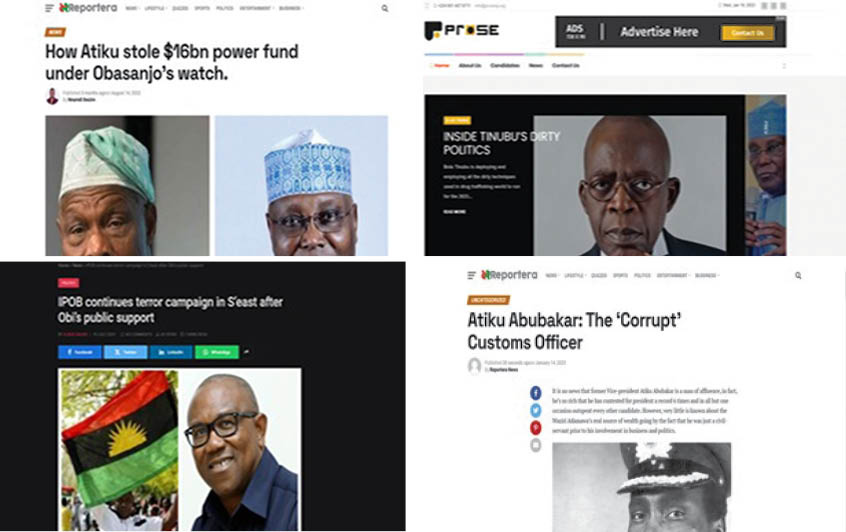
Republican News author Ike A. Offor, who also has done editing work, did not answer messages sent to his X and Facebook accounts. Prose Nigeria, WiseReporters and Podium Reporters also did not answer repeated requests for comment.
Idayat of CSIS said that there was a “proliferation of blogs funded or operated by political parties and their activists.” Some of the sites, like Podium Reporters, even produced partisan “fact checks” that favored their candidate, further muddying the information waters, she said.
“These are made more believable by the fact that conventional media has been sharing video content and advertisements from candidates and parties that violate the Broadcast Code of Nigeria and the Peace Accord, signed by all the chairs of the 18 Nigerian political parties and their candidates, which prohibits the use of fake news, hate speech and promotes issue-based politics,” Idayat said.
COORDINATED, INDIVIDUAL SOCIAL MEDIA EFFORTS
Social media influencers shared dubious content, too.
Using a cocktail of online tools, CCIJ identified five campaigns that appeared to be coordinated by X influencers @drpenking, @redcap_blondie, @firstladyship, @AreaFada1, @omoelerinjare and @VictorIsrael_. These six accounts had a combined total of close to 1 million X followers at the time of the election.
Along with multiple accounts on X and Facebook, these influencers declared false results for Obi in respect of Plateau and Anambra states where Obi actually won, asserting that he received more than over 1 million votes in each state.
An INEC collation officer said that there were 1.1 million votes cast in Plateau State and fewer than 1 million votes cast in Anambra State. Obi polled a total of close to 600,000 votes in Anambra and more than 450,000 votes in Plateau State, the officer said.
CCIJ’s effort to speak to these accounts’ owners proved unsuccessful. Only @drpenking and @redcap_blondie’s accounts were open to receiving messages. Requests for interviews and multiple messages sent to @drpenking were ignored and then blocked, while @redcap_blondie alleged that INEC manipulated the election results.
Nigerian musician Charles Oputa, popularly known as Charly Boy, has the most followers of the six accounts. He used altered and modified videos and images to back Obi in multiple false posts that generated millions views on his X account between September 2022 and May 2023, CCIJ found.
He declined repeated requests for comment, but University of Lagos Journalism and Mass Communication Associate Professor Ifeoma Theresa Amobi argued that influencers played an impactful role in voter turnout.
“I think the messages from websites and influencers played a part in voter turnout,” she said. “I feel like Nigeria has lost confidence in the voting system in the country. Some of those who follow influencers will tend to agree and align with them if they say this system is fraudulent and there is no point in voting.”
NON-IMPLEMENTATION OF EXISTING LAWS
The flood of false information from these sources appears to violate Nigerian law regulating the spread of fake news.
Subsection 59 of the Criminal Code explicitly forbids the publication of false information with the purpose of alarming the public. It further states that ignorance of the statement’s falsity is not a defence unless reasonable measures were taken to verify its accuracy before publication.
Besides Femi Fani-Kayode’s interrogation by the State Security Service in February 2023 following a tweet that appeared to question whether the country was about to experience another coup d’etat attempt, none of the purveyors of false information in the build-up to the 2023 general election reviewed by CCIJ have been publicly disciplined for violating the law.
Kehinde of FactCheckHub said that the lack of prosecution emboldened the actors. “These misinformation actors keep increasing by the day because they’ve not been held accountable, not because there’s no legislation in place to checkmate their activities,” he said.
Meanwhile, more than two dozen journalists in Nigeria have faced prosecution in recent years on charges stemming from the Cybercrimes Act, according to an article published in April 2024 by Al-Jazeera.
The Cybercrimes Amendment Act of 2024, an amended version of the 2015 legislation, was signed into law in February 2024. In May 2024, Foundation for Investigative Journalism reporter Daniel Ojukwu was arrested by police and held without charge for over a week for alleged violations of the Cybercrimes Act. [Editor’s Note: Ojukwu is a colleague of story co-author Sodeeq Atanda.]
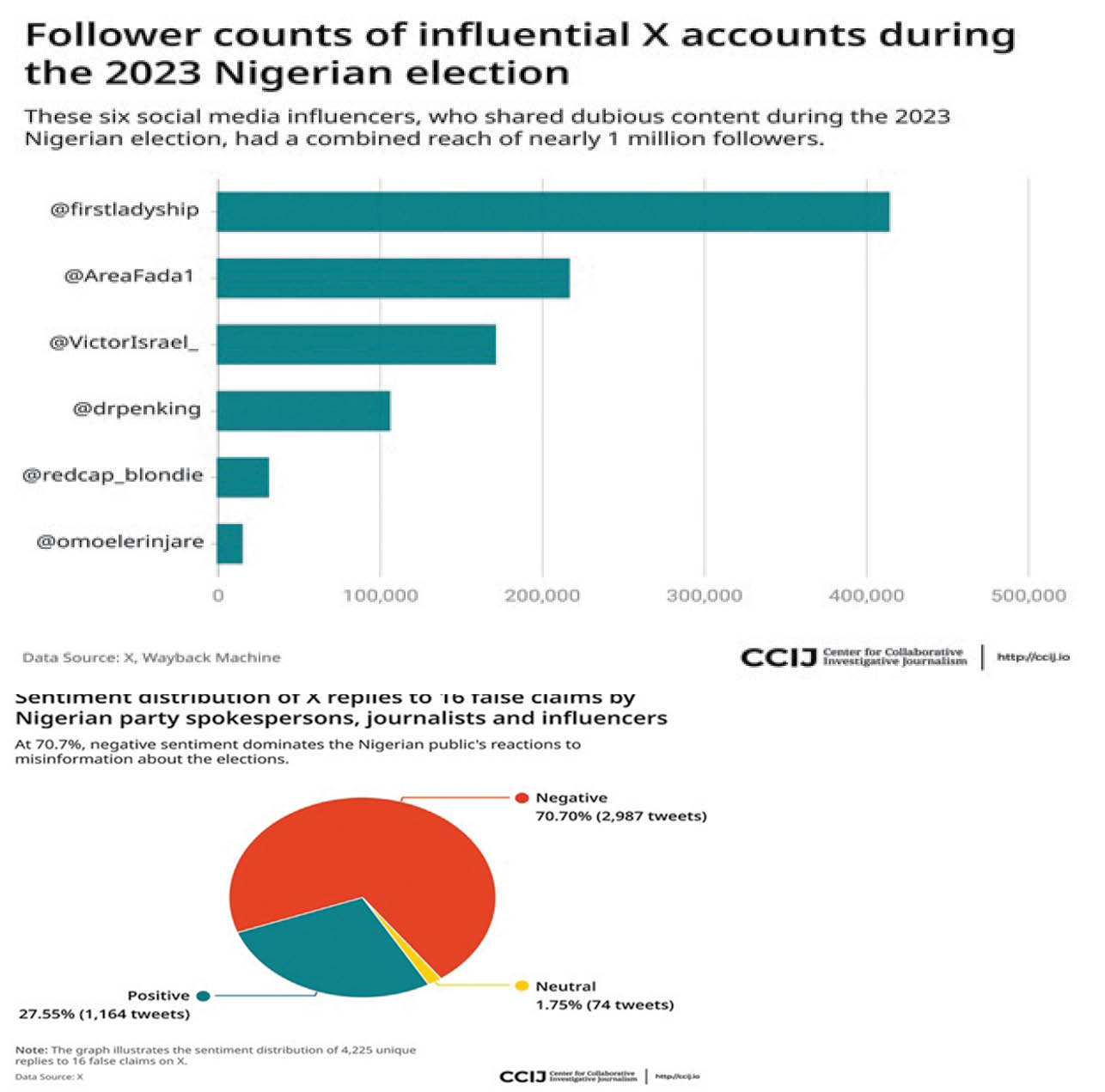
The National Information Technology Development Agency (NITDA) Code of Practice also addresses false information. Developed with input from social media platforms, the code outlines measures to combat harmful online information. It requires online platforms to deactivate accounts spreading misinformation and remove unlawful content within 48 hours of being notified by the government.
Platforms like X have failed to comply with these provisions, only rarely taking down posts, according to Hadiza Umar, head of corporate affairs at NITDA. “We have written to them but they have ignored us,” she said.
Umar explained that the agency lacks the authority to sanction, stating that it only reviews and escalates complaints about fake news, particularly when it threatens national security. “We are developing a platform where complaints can be submitted to,” she said.
Civil society activist Ajanaku said that social media platform owners don’t take decisive actions even when accounts are reported to them because they struggle to ensure that people do not abuse the right to free speech by spreading disinformation.
“Disinformation plays into the business model of these platforms because it is driven by engagement and so, if a particular claim goes out there, regardless of whether it is false or not, it gains traction and that is revenue,” he said.
X, Facebook and Instagram all did not answer requests for comment.
INEC’S ACTIONS, EXPERT SKEPTICISM
In contrast with the social media platforms’ lax involvement, INEC touted in its February 2024 report the measures it took to counter false information. These included placing advertisements in major national newspapers, making announcements on radio stations and holding meetings in November 2021 with media executives, online publishers and line editors in Lagos.
The report said that the commission’s social media posts in late February and mid-March generated nearly 54 million impressions on X and reached more than 1.8 million people on Facebook and Instagram.
“While the challenges of fake news, misinformation and disinformation remain, much of what would have adversely impacted the narratives around the election were mitigated by the Commission’s proactive engagement with the media underscored by its transparency, accessibility, and sincerity,” it wrote.
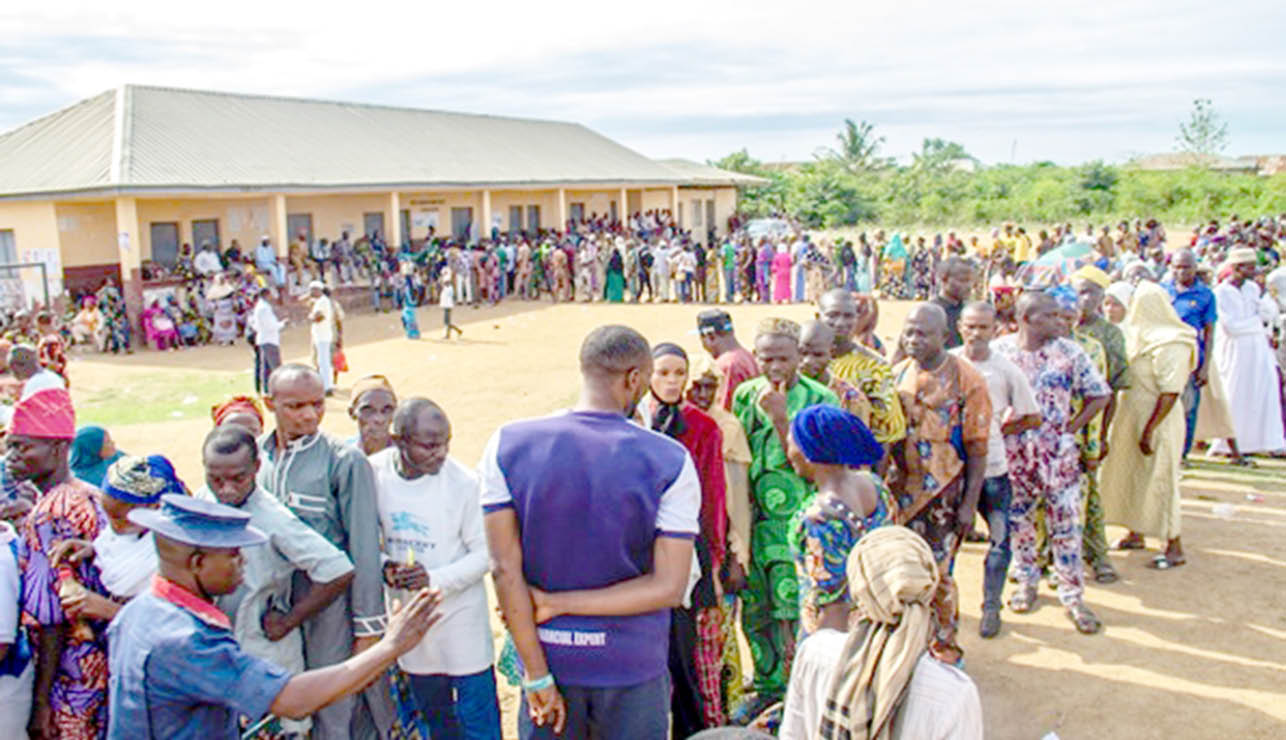
CCIJ submitted a detailed list of questions in a public records request to INEC about its actions and the basis for its assertions. The agency acknowledged receiving the questions, but had not provided answers at the time of this publication.
CCIJ also conducted a survey through its partner newsrooms of Nigerians about election misinformation that included a question about whether respondents were aware of INEC’s advertisements and whether they were effective. Many said they were not aware of INEC’s efforts.
Idayat of CSIS acknowledged the commission’s attempts to provide accurate information and counter false claims, but added that the “sheer volume and speed at which disinformation spread” made it difficult to keep pace.
“Combating disinformation requires a multi-faceted approach involving legal, technological and educational strategies to protect the integrity of elections and democracy in Nigeria,” Idayat said, advocating for a stronger legal framework with more rapid response time and stiffer penalties that can deter such behavior.
Ordinary citizens who use social media may be a key part of that multi-pronged approach.
CCIJ looked at a portion of the replies to 16 false claims party spokespersons, journalists and influencers posted on X. In every case, more than half of the replies criticized the false information. This included Fani-Koyode’s tweet about the fictitious coup plot. More than 80% of the 221 replies to that tweet were negative, according to CCIJ’s analysis.
“APC is in power, and so in charge of the Nigerian army,” businessman Somto Onuchukwu tweeted in response to Fani-Kayode and Abubakar, stamping the words “FAKE NEWS” in red letters over a picture of Fani-Kayode’s tweet. “Instead of accepting defeat, they’re busy looking for meetings that never happened.”
This story was produced by the Center for Collaborative Investigative Journalism (CCIJ) with the support of MuckRock and the Filecoin Foundation for the Decentralized Web.
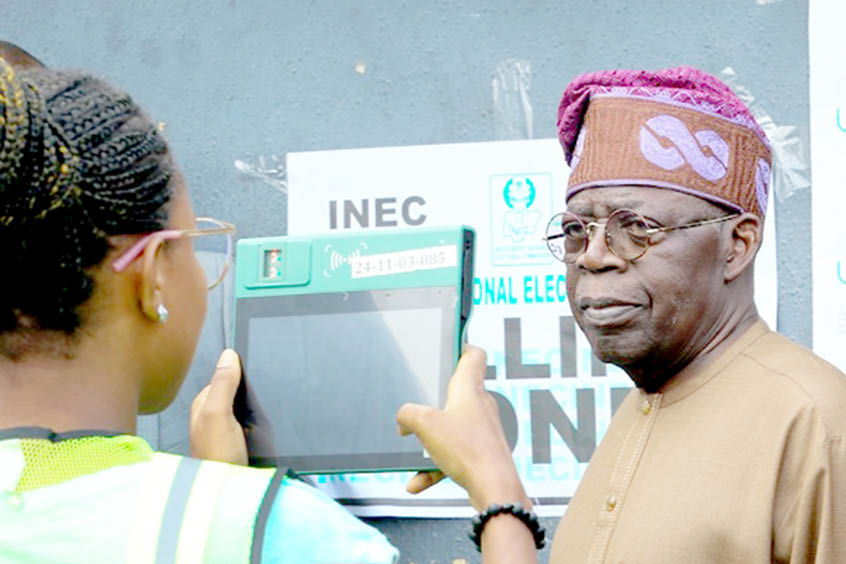
 Join Daily Trust WhatsApp Community For Quick Access To News and Happenings Around You.
Join Daily Trust WhatsApp Community For Quick Access To News and Happenings Around You.